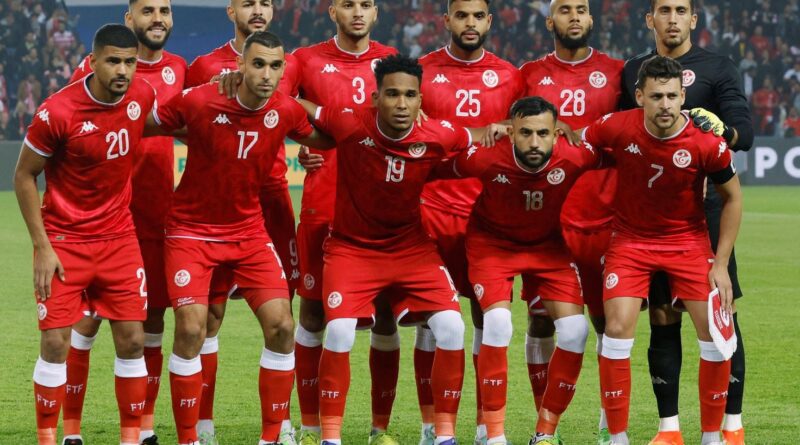Binewa Team Profile: Tunisia at TotalEnergies AFCON 2023
By Muambo E. Lyonga
Tunisia, is the northernmost country in Africa. It is a part of the Maghreb region of North Africa, bordered by Algeria to the west and southwest, Libya to the southeast, and the Mediterranean Sea to the north and east. It features the archaeological sites of Carthage dating back to the 9th century BC, as well as the Great Mosque of Kairouan. Known for its ancient architecture, souks, and blue coasts, it covers 163,610 km2 and has a population of about 12.1 million. It contains the eastern end of the Atlas Mountains and the northern reaches of the Sahara desert; much of its remaining territory is arable land. Its 1,300 km of coastline includes the African conjunction of the western and eastern parts of the Mediterranean Basin. Tunisia is home to Africa’s northernmost point, Cape Angela. Located on the northeastern coast, Tunis is the capital and largest city in the country. Tunisia is named after Tunis.
The Carthage Eagles have participated in six FIFA World Cups and will be making their 21st AFCON appearance in Côte d’Ivoire. The 2004 winners have been on the AFCON podium four times since making their debut in 1962. They hold the record for the number of consecutive participations with 16 between 1994 and 2023.
Team Bio
With five different goal scorers all with one goal each, Tunisia announced their arrival to the AFCON with a third place finish in Ethiopia in 1962. With just four teams participating, Tunisia lost their semifinal game to hosts Ethiopia on a 4-2 score line. In the classification game against Uganda, goals from Mohamed Salah Jedidi, Laaouini and Meddab handed Tunisia the win and the Bronze medal.
In 1963 in Ghana, the number of participants increased to six and the teams were drawn in two Groups of three teams each. They finished bottom of the Group after a 1-1 draw with Ghana and a 4-2 loss to Ethiopia. Mohamed Salah Jedidi scored two goals in the tournament but Tunisia were eliminated in the Groups stage.
They hosted the tournament for the first time in 1965 and finished as runners-up. They finished top of Group A after a 4-0 win over Ethiopia and a 0-0 draw with Senegal. They lost the final 3-2 to Ghana with goals from Frank Odoi with a brace and Osei Kofi for Ghana. Abdelmajid Chetali and Tahar Chaïbi with his third of the tournament were on target for the hosts but it was enough for them to lift the trophy.
Tunisia failed to qualify participate in the next five tournaments either because they did not enter or did not qualify.
They returned in 1978 in Ghana and finished fourth in the now eight nations tournament. Drawn in Group B with Uganda, Morocco and Congo, the Carthage Eagles finished second of the group. They drew 1-1 with Morocco and 0-0 with Congo but made sure with a 3-1 over Uganda. In the semifinals, Abdul Razak scored the winner for eventual winners Ghana. The third place game against Nigeria was full of drama. The match was abandoned after Tunisia walked off in the 42nd minute with the score tied at 1–1 to protest the officiating. Nigeria were awarded a 2–0 win, and Tunisia were suspended for two years (also banning them from the next tournament).
They returned to the AFCON in 1982 in Libya. They were drawn in Group A with Libya, Ghana and Cameroon. A 1-1 draw with Cameroon and defeats to Libya(2-0) and Ghana(1-0), saw Tunisia eliminated at the Groups stage as bottom of Group A.
They failed to qualify for the next five tournaments and only returned in 1994 as hosts and since then they have not missed out of the competition. Even as hosts, Tunisia were eliminated at the Groups stage of the 12 nations tournament as bottom of Group A after a 0-2 loss to Mali and a 1-1 draw with Zaire.
In the 20th edition of the tournament in 1996 hosted by South Africa, Tunisia had a more honourable performance. Drawn in Group D with Côte d’Ivoire, Ghana and Mozambique, Tunisia held on to second place finish in the Group. Despite losing to Ghana 2-1 and 1-1 draw with Mozambique, Tunisia made sure of a place in the knockout stage with a 3-1 win over Côte d’Ivoire thanks to a brace from Ben Younnes and Ben Hassen. Their quarterfinals game against Gabon went down to the wire after a 1-1 draw in regular and extra time. The game was decided in shootout in favour of Tunisia with a 4-1 win. In the semifinal against Zambia, a brace from Adel Sellimi and goals from Zoubeir Baya and Kaies Ghodhbane cancelled out the goals from Dennis Lota and Hillary Makasa as Tunisia had a comfortable 2-4 win. The stage was set for an exciting final against South Africa. For the second time, Tunisia was in an AFCON final and for the second time they lost as hosts South Africa won the trophy with 2-0 win thanks to goals from Mark Williams.
In 1998 in Burkina Faso, Tunisia dominated Group B despite losing to Ghana(2-0) in their first game. They rallied to beat DR Congo (2-1) and Togo(3-1) in their next two group games to finish top of the group. At the quarterfinals they lost to host Burkina 8-7 in post match penalties after a 1–1 in regular and extra time. Mehdi Ben Slimane, Hassan Gabsi and Ziad Tiemçani all scored two goals each but Tunisia failed to shine past the quarterfinals huddle.
In the next tournament cohosted by Nigeria and Ghana Tunisia improves from their previous performance. Despite a 4-2 loss in their first game in Group D against Nigeria, they settled for a share of the spoils with Morocco in a 0-0 draw before Radhi Jaïdi’s 18th minute strike gave them a vital win against the Congo. They finished second in Group D with four points. Defender Khaled Badra was their hero in the quarterfinals against Egypt with the lone goal of the game from the spot at the 22nd minute. Cameroon proved to be too strong for them at the semifinals as a brace from Patrick Mboma and a goal from Samuel Eto’o saw off the Tunisian challenge. They settled for fourth place after losing to South Africa in the classification game in another nail biting shootout. Ali Zitouni scored twice for Tunisia but Shaun Bartlett with his fifth of the tournament and Siyabonga Nomvethe draw South Africa level. South Africa prevailed in the shootout 4-3 after extra and normal time.
They followed up with a disappointing groups stage exit in 2002 in Mali, virgin draws with Zambia and Senegal and a 1-0 loss to Egypt saw them finish third in Group D. But glory was beckoning.
Tunisia eventual had their moment of glory on home soil in 2004.
Francileudo Santos inspired them to top spot in Group A after win against Rwanda (2-1) and DR Congo (3-0) and a 1-1 draw with Guinea. Santos scored three goals in the Groups stage and looked unstoppable. Jawhar Mnari was their goal scorer in the quarterfinals against Senegal and Jay Jay Okocha’s Nigeria was next in the semifinal. The Nigerian playmaker opened the scoring from the spot at the 67th minute with his third of the tournament, but Tunisia had a reply with a penalty of their own at the 82nd minute through Khaled Badra. The game was decided in a shootout.
Peter Odemwingie missed his spot kick and Tunisia progressed to the final on a 5-3 score line. Tunisia was now a win away from AFCON glory. Morocco was the last huddle. Francileudo Santos sent the home fans to cloud seven with a fifth minute curtain raiser. Youssef Mokhtari equalized for the Atlas Lions at the 38th minute. Ziad Jaziri’s 52nd minute left the 60,000 fans in the November 7, Stadium jubilating like never before or after. Tunisia finally had their moment of glory they were at the summit of African football at last!!
In 2006 in Egypt, they finished second in Group C, behind Guinea and above Zambia and South Africa. A 4-1 win over Zambia and a 2-0 win South Africa meant that the 0-3 loss to Guinea in their final group game was inconsequential.
In the quarterfinals against Nigeria, Victor Obinna opened the scoring for Nigeria and Karin Haggui replied for Tunisia and the game went down the wire with the decision made in another epic shootout. Nigeria carried the day 6-5.
In 2008 in Ghana, Tunisia were Group D winners with five points after 2-2 draw with Senegal in their opening game, a 3-1 win against South Africa was much welcomed in their second game. They qualified for the quarterfinals unbeaten after a 0-0 draw with Angola. In the quarterfinals, Cameroon took a two goal lead thanks to goals from Stephane Mboa at the 18th minute and Geremi Njitap at the 27th. Tunisia found a way back in the game. Ben Saada at the 34th minute and Yassine Chikhaoui at 81st got Tunisia’s equalizing goals to take the game into extra time. Stephane Mbia at the 93rd minute got his second of the game and Cameroon’s winner which sent Tunisia parking.
In 2010 in Angola, Tunisia finished 12th overall as they ended bottom of Group D with three points behind Zambia, Cameroon and Gabon all on four points each. They drew all their three games in the Group and were eliminated unbeaten.
In the 2012 tournament cohosted by Equatorial Guinea and Gabon, the Carthage Eagles were in C. They finished second with six points behind Gabon with nine and ahead of Morocco with three and Niger with no point. The evergreen Youssef Msakni scored in their 1-2 wins against Morocco and Niger to see them through to the next round despite losing 1-0 to Gabon. In the quarterfinals against Ghana, Saber Khalifa cancelled out John Mensah’s early goal and the game went into extra time. Andre Ayew handed Ghana the semifinals ticket with the winner at the 100th minute.
A disappointing group stage elimination followed in the 2013 tournament in South Africa. They failed to qualify from Group D as Côte d’Ivoire and Togo progressed to the knockout stage. Youssef Msakni scored a late winner in their 1-0 win over Algeria but a 3-0 loss to Côte d’Ivoire and a 1-1 draw with Togo saw them bow out at the group stage for a sixth time in their 16th participation.
In the 2015 edition in Equatorial Guinea, Tunisia had one of the tournament’s top scorers, Ahmed Akaichi with three goals but ended at the quarterfinals. They finished top of Group B after a 1-1 draw in their first game against Cape Verde, a 1-2 win over Zambia in their second game with Akaïchi scoring his first goal of the tournament and a 1-1 draw with DR Congo in their final group game, with Akaïchi’s second goal of the tournament. Against hosts Equatorial Guinea in the quarterfinals, Ahmed Akaichi gave them the lead at the 70th minute, but the hosts equalized at the 90+3 minute through Javier Balboa from the spot and got their winner deep into extra time through the same Balboa at the 102nd minute to end any Tunisian dreams of a second AFCON triumph.
In 2017 in Gabon, Tunisia were drawn in Group B with Senegal, Zimbabwe and Algeria. After losing 2-0 to Senegal in their first game, they rallied to best Algeria 2-1 thanks to an own-goal from Aïssa Mandi and a goal from Niam Sliti. They made light work of Zimbabwe in their final group game with a 2-4 mauling. Goals from Sliti, Youssef Msakni, Yassine Khenissi and Wahbi Khazri ensured them a second place finish in the group with six points behind Senegal with seven.
Burkina Faso gave them no chance in the quarterfinals, as Aristide Bancé and Préjuce Nakoulma’s goals saw them for the second consecutive time eliminated at the level of the quarterfinals.
In their 19th participation in the AFCON in 2019, Tunisia finished fourth for the third time, after 1978 and 2000. For the first time, the tournament had 24 teams and the Carthage Eagles were drawn in Group E with Mali, Angola and debutants Mauritania. They scrambled their way to the knockout stage with three underwhelming draws. A 1-1 draw in their first game with their evergreen Msakni scoring from the spot, was followed by another 1-1 draw with Mali thanks to a goal from Wahbi Khazri. They rounded up the groups stage with a 0-0 draw with Mauritania. In the round of 16, they came up against four time winners Ghana. The game went down to the wire. Taha Yassine Khenissi gave Tunisia the lead at the 73rd minute, but an own-goal from defender Rami Bedoui at the 90+2 took the game to extra time. The game was decided in a shootout, Ghana’s Caleb Ekuban failed to show nerves of steel and missed his spot kick. Tunisia were through to the quarterfinals for a 10th time in their 19th AFCON participation. In the quarterfinals, an impressive Madagascar were their next opponents. Tunisia showed the full weight of their experience over the debutants. Goals from Ferjani Sassi, Youssef Msakni and Niam Sliti gave them a 3-0 win and a place in the last four. Pre-tournament favorites Senegal were their semifinal opponents. They matched them toe-to-toe until and extra time own-goal from their rather reliable defender Dylan Bronn proved to be the undoing. They had to settle for the third place classification game against the other unfortunate semifinalists, Nigeria. Odion Ighalo’s third minute goal was all Nigeria needed for the bronze medal while Tunisia finished fourth in the AFCON the third time.
Cameroon hosted the 33rd edition of the tournament and the Carthage Eagles were present for the 20th time. Drawn in Group F with Mali, Gambia and Mauritania, Tunisia finished third with three points after losing to Mali(1-0) and Gambia(1-0), they only won against Mauritania (4-0). That huge win will prove to be vital as they qualified as best losers for the knockout stage. Against three times winners Nigeria at the Roumde Adja Stadium in Garoua, Youssef Msakni stroke again. His 47th minute goal saw off the Nigerian challenge and for the 11th time, Tunisia were quarterfinals. Dango Ouattara scored the lone goal the game for Burkina Faso as for a seventh time, Tunisia’s AFCON journey was ended at the quarterfinals.
With a total of 80 games played, win 25 win, 29 draws and 26 losses with 99 goal scored and 94 conceded, Tunisia are certainly an AFCON heavyweight.
The Journey
Tunisia were drawn in Group J with Equatorial Guinea, Libya and Botswana. The teams played against each other in a home-and-away round-robin format between between 1 June 1, 2022 and September 7, 2023.
Tunisia and Equatorial Guinea, the group winners and runners-up respectively, qualified for the 2023 Africa Cup of Nations.
Earlier results
Game day 1
Tunisia 4-0 Equatorial Guinea
Game day 2
Botswana 0-0 Tunisia
Game day 3
Tunisia 3-0 Libya
Game day 4
Libya 0-1 Tunisia
Game day 5
Equatorial Guinea 1-0 Tunisia
Game day 6
Tunisia 3-0 Botswana
Qualifications group
Tunisia 13 pts
Equatorial Guinea 13 pts
Botswana 4 pts
Libya 4 pts
Players to watch
Youssef Msakni
Youssef Msakni was born on October 28, 1990 in Tunis, Tunisia. He currently plays as a forward for Qatari top flight side Al Arabi. He will be participating in his sixth consecutive AFCON tournament after making his debut at the age of 19 in 2010 in Angola. He was Tunisia’s top scorer in the qualifiers with five goals and he is currently their most capped player and top goal scorer with 98 caps and 22 goals. The 2012 and 2017 Tunisian Footballer of the year will be their spearhead in Côte d’Ivoire.
Taha Yassine Khenissi
32-year-old Kuwait SC forward Taha Yassine Khenissi is one of the most experienced players in the Tunisian team on the plane to Côte d’Ivoire. The native of Zarzis with 50 caps and nine goals with the Tunisian national team will be another player to keep a close eye on. The former Esperance of Tunis and CS Sfaxien forward is an experienced AFCON campaigner.
Naim Sliti
With 71 caps and 13 goals to his name Al Ahli Doha’s 31-year- old winger Naim Sliti will be another key member of the Carthage Eagles in this tournament. Sliti was born in Marseille, France, to Tunisian parents. He made his debut for the Tunisia national team in a 2017 Africa Cup of Nations qualification 3–0 victory against Djibouti on June 3, 2016, wherein he scored his debut goal. In June 2018 he was selected in the final 23-man squad for the 2018 FIFA World Cup in Russia. The former Sedan, Paris FC, Dijon and Al Ettifaq winger is without any doubt another experienced AFCON campaigner who will making his third AFCON appearance in Côte d’Ivoire.
Coach
Jalel Kadri
52-year-old Jalel Kadri will be the Tunisian football conductor in Côte d’Ivoire. Born in Tozeur on December 14, 1971, Kadri’s coaching career started in 2001 with AS Djerba. He moved on to coach AS Kasserine, AS Gabès and US Monastir. During the 2008–09 season, he was head coach at ES Zarzis, then from spring to summer 2010 at EGS Gafsa, and from November 2011 to May 2012 at Al-Ansar FC. He was then appointed coach of ES Beni-Khalled from May to September 2012. In 2013, he had his first spell with the Tunisian national team as assistant coach for a few games. Coaching stints with Saudi club Al-Nahda, Al-Khaleej Club, JS Kairouan, CA Bizertin, Emirates Club, Stade Tunisien and Al Ahli Tripoli before becoming assistant coach of the Tunisian national team again in June 2021, this time under Mondher Kebaier, with whom he accompanied the team to the 2021 Africa Cup of Nations, where he became head coach in the round of 16 because Kebaier contracted Covid-19. On January 30, 2022 he was appointed temporary coach after being eliminated from the quarter-finals of the Africon against Burkina Faso. In the process, he led the team to qualify for the 2022 FIFA World Cup, allowing him to become a permanent coach of the senior side.
2023 AFCON matches Group E
Tunisia will kick-start its campaign against Namibia on January 16, and play against Mali on the 20th and 1996 winners South Africa in a remake of the 1996 final on the 23rd of January respectively.




